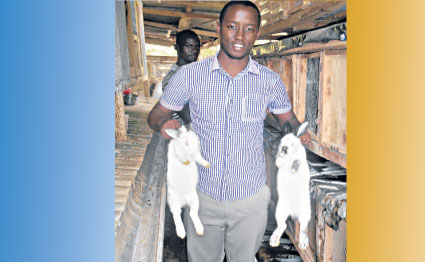Inside makeshift wood and wire mesh hutches somewhere in Rongai, on the outskirts of Nairobi, a group of rabbits, nibble away at pellets and vegetable leaves.
The bunnies do not stop nibbling as some dart from one corner of the hutch to another.
Antony Rume, the owner of the rabbits, dips his right hand into the cage and attempts to catch one, but it darts to a corner.
“I wouldn’t exchange my bunnies for chickens or any other animal. They are the best thing I have currently,” the 25-year-old says.
Rume began the project in September last year. “I started with 11 bunnies; 10 does and one buck. I bought them from a rabbit organisation that was selling each at Sh2,000 male and Sh2,500 female,” says the Moi University economics graduate.
Fresh from college, he had initially thought of venturing into poultry farming. But Rume says he realised poultry requires more space and capital to set up and run.
“I talked to a friend and he advised me to keep rabbits. He told me that it was cheaper to feed the animals and the market for their meat was growing in city restaurants and hotels.”
A kilo of rabbit meat is currently retailing at between Sh350 and Sh500.
Armed with the idea, Rume approached his mother for startup capital.
“I could not bank on my savings since I was fresh from college. I also did not want to sit at home and depend on her for all my needs. I talked to my mother and a close relative. They both supported my idea,” he recalls.
His mother, a nurse, offered him Sh20,000. He raised Sh15,000 from friends.
Today, Rume’s venture has multiplied tenfold. He owns more than 100 bunnies and reckons he has made close to Sh200,000 since he started. “I sell the animals to farmers and there are people who come to buy them from here.”
According to him, rabbit meat is becoming a delicacy in the country as people move away from rearing them as pets.
He also sells the rabbits to an institution called Rabbit Republic and to a hotel in Hurlingham, Nairobi.
According to Peter Waiganjo of Rabbit Breeders Association of Kenya (Rabak), whose members supply rabbit meat to the various supermarkets, the future is bright for bunny farmers.
“Rabak has witnessed a tremendous growth. Currently we have over 1,500 members. This is due to the increased membership and demand for rabbit meat in various parts of the country. This demand means well for farmers,” he says.
What is pushing many to rabbit eating are the associated health benefits. “Unlike beef, rabbit meat is white and has lower cholesterol, fat and calories than chicken and pork,” he says.
There are about 48 bunny breeds worldwide, but the most popular with local farmers are New Zealand White and Californian White. Others include Flemish and Ilri giants.
New Zealand Whites are slightly larger than the Californian Whites and slightly heavier as they weigh between 4 and 6kg as opposed to 3 to 4.5kg for the latter.
It is not just individuals who are keen to invest in bunnies. The government is also interested and is planning to put up an abattoir in Thika Town to boost bunny farming. Once operational, bunny farmers like Rume are upbeat that the abattoir will open up local and international meat markets.
For maximum gains from cuniculture, Jane Ikanyi, a livestock researcher at the International Livestock Research Institute recommends commercial pellets and vegetables. These prevent stomach bloat and help them grow faster.
“Pellets are hygienic and also contain necessary nutrients and vitamins that help rabbits grow. A rabbit is supposed to eat 150g of pellets a day,” she added.









